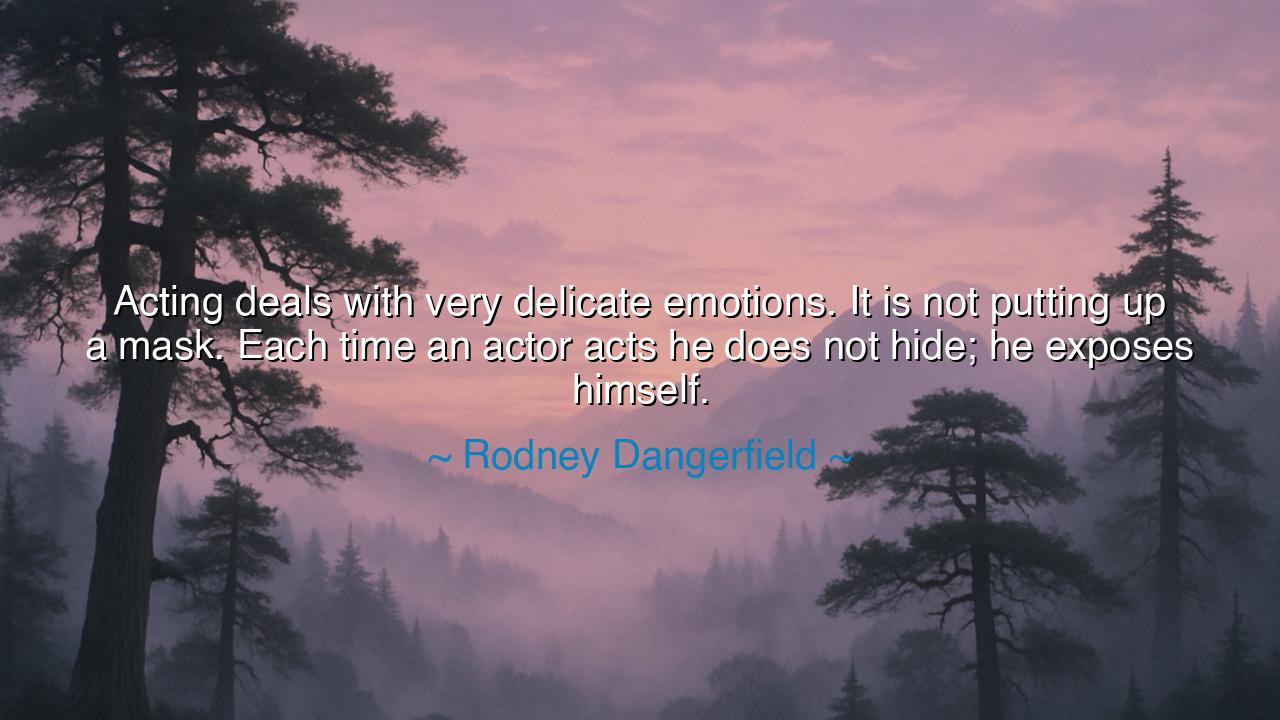
Acting deals with very delicate emotions. It is not putting up a
Acting deals with very delicate emotions. It is not putting up a mask. Each time an actor acts he does not hide; he exposes himself.






The words of Rodney Dangerfield unveil a truth that many overlook: acting is not the craft of concealing, but the sacred art of revealing. To act is not to wear a mask, but to strip away the layers we cling to in daily life and to stand vulnerable before the world. The stage is not a place for hiding; it is a place of exposure, where the soul of the actor is laid bare, trembling and luminous, for all to witness.
When Dangerfield says that acting deals with delicate emotions, he speaks to the fragility of the human heart. Joy, grief, love, and despair are not trinkets to be played with; they are the fibers that bind life itself. The actor does not simply imitate them, he breathes them anew in the present moment, offering his own spirit as the vessel. What seems like performance is, in truth, a daring confession: “This is what it means to be human.”
Think of Edmund Kean, the great English actor of the nineteenth century. He was said to burn with such intensity on stage that his audiences felt as though his own heart had been torn open before them. When he played Othello, his grief was not an imitation—it was real, so much so that those who watched him swore they could feel his torment in their own blood. Such is the sacred danger of acting: it calls the actor to bleed inwardly so that others may recognize themselves in that shared wound.
Thus, the actor is like a warrior of the soul. Where the warrior exposes his body to steel, the actor exposes his inner being to judgment, misunderstanding, and sometimes ridicule. Yet without such courage, the play remains lifeless words upon a page. It is through this fearless exposure that stories gain power to heal, to provoke, and to awaken. The actor becomes both mirror and messenger, revealing not only himself, but the hidden selves of all who watch.
Dangerfield’s insight pierces deeper still. In life itself, are we not all actors? Each day, we may choose to wear a mask, to hide our true feelings behind polite smiles and hardened faces. Yet the rare soul who dares to live with authenticity, who exposes his heart even when it trembles, becomes a beacon to others. Just as the actor’s vulnerability gives life to the stage, so does honesty give life to our human bonds.
To the seekers of wisdom, let this lesson take root: do not confuse strength with concealment. True strength lies in the willingness to be seen, to admit one’s joys, sorrows, and fears. For only that which is revealed can be understood, and only that which is shared can unite us. Masks may protect for a season, but they also suffocate the breath of connection.
In practice, this teaching calls for courage in both art and life. When you create, let it come from the deepest chambers of your heart, not from what you think others expect. When you speak, let your words be true, even if your voice shakes. When you love, love fully, without retreat behind the armor of indifference. As actors expose themselves to give meaning to their craft, so too must we expose ourselves if we wish to give meaning to our days.
So let this be passed to future generations: to act is to reveal, and to live is much the same. Do not hide behind masks, for masks perish, but the soul that dares to stand unveiled shines like a flame through the ages.






AAdministratorAdministrator
Welcome, honored guests. Please leave a comment, we will respond soon